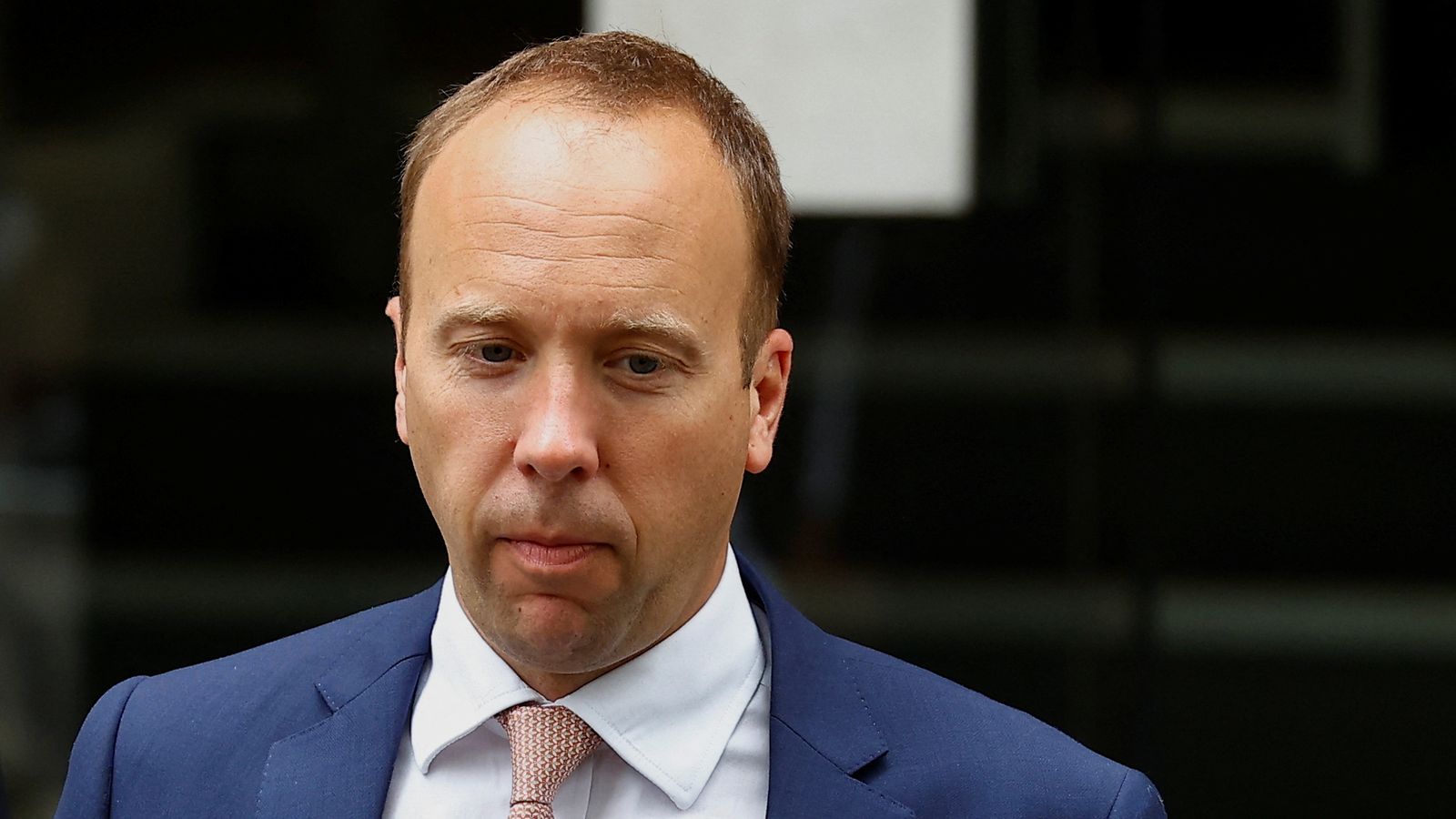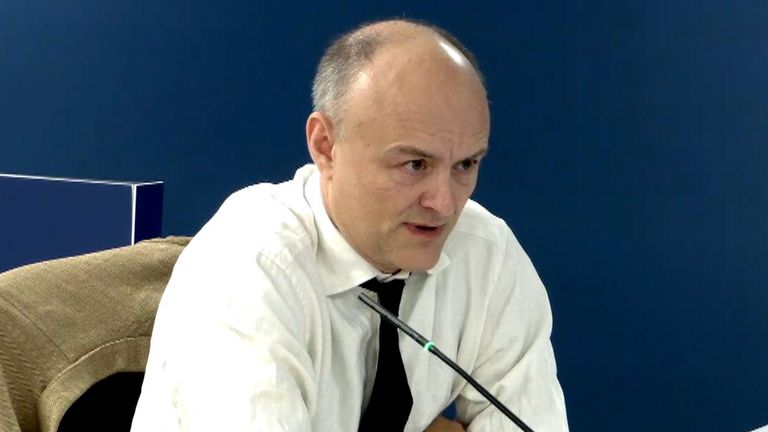[ad_1]
Former health secretary Matt Hancock played a key role in the UK’s response to the COVID pandemic – and his decisions will now be scrutinised during the official inquiry.
Mr Hancock was a familiar face at the regular press conferences that took place during that period, giving updates to the public about social distancing measures, the state of the NHS and the vaccine programme.
In 2021, he was forced to resign after he admitted he broke the government’s own coronavirus guidance to pursue an affair with an aide.
On Thursday he is due to give evidence to the COVID inquiry.
He will follow a string of high-profile witnesses who have already shared their experience of the pandemic with inquiry chair Baroness Hallett, including Dominic Cummings, Boris Johnson’s former chief adviser, Lord Simon Stevens, who was the chief executive of the NHS at the time, and former chief scientific adviser Sir Patrick Vallance.
Mr Hancock has already featured heavily in the testimonies of the witnesses who have given evidence to the inquiry so far.
Raab to face COVID inquiry; why Cleverly is ‘angry’ about the Rwanda policy
A spokesperson for Mr Hancock says he has “supported the inquiry throughout and will respond to all questions when he gives his evidence”.
Read more:
Hancock ‘wanted to decide ‘who should live and die’
Gove says lockdown went against Johnson’s ‘world view’
Former NHS CEO Lord Stevens made this assessment of Mr Hancock when he appeared before the COVID inquiry at the beginning of November.
“The secretary of state for health and social care took the position that in this situation he – rather than, say, the medical profession or the public – should ultimately decide who should live and who should die,” he said in a written statement to the inquiry.
“Fortunately, this horrible dilemma never crystallised.”
However, although Lord Stevens suggested that Mr Hancock wanted too many powers in his capacity as health secretary, he did add that “for the most part” the former cabinet minister could be trusted.
“There were occasional moments of tension and flashpoints, which are probably inevitable during the course of a 15-month pandemic but I was brought up always to look to the best in people,” he said.
‘Nuclear levels of over-confidence’
The day before Lord Stevens gave evidence, the COVID inquiry heard from Helen MacNamara, who was deputy cabinet secretary during the pandemic.
She told the inquiry Mr Hancock showed “nuclear levels” of confidence at the start of the COVID pandemic and “regularly” told colleagues in Downing Street things “they later discovered weren’t true”.
For example, Ms MacNamara said the former health secretary would say things were under control or being sorted in meetings, only for it to emerge in days or weeks that “was not in fact the case”.
She also recalled a “jarring” incident where she told Mr Hancock that it must have been difficult to be health secretary during a pandemic, to which he responded by miming playing cricket, saying: “They bowl them at me, I knock them away” during the first lockdown.
‘Lied his way through this and killed people’
There is clearly no love lost between Mr Hancock and Mr Cummings, who told the inquiry that he repeatedly called for Boris Johnson to sack him.
Mr Cummings alleged that the ex-health secretary “lied his way through this and killed people and dozens and dozens of people have seen it”.
In a message sent to Mr Johnson in May 2020, Mr Cummings said: “You need to think through timing of binning Hancock. There’s no way the guy can stay. He’s lied his way through this and killed people and dozens and dozens of people have seen it.”
In August 2020, he wrote again: “I also must stress I think leaving Hancock in post is a big mistake – he is a proven liar who nobody believes or [should] believe on anything, and we face going into autumn crisis with the c**t in charge of NHS still.”
Mr Cummings also echoed Ms MacNamara’s accusation that the former health secretary told colleagues things that later were discovered not to be true, saying he “sowed chaos” by continuing to insist in March 2020 that people without symptoms of a dry cough and a temperature were unlikely to be suffering from coronavirus.
He also revealed that he purposefully excluded Mr Hancock from meetings because he could not be trusted.
Mark Sedwill wanted Hancock removed to ‘save lives and protect the NHS’
Messages exchanged by Lord Mark Sedwill, the former head of the Civil Service and Simon Case, the current cabinet secretary, revealed that Lord Sedwill wanted Mr Hancock removed as health secretary to “save lives and protect the NHS” – a play on the pandemic-era slogan at the time.
Lord Sedwill said this was “gallows humour” and that he did not use the work “sack” when speaking to Mr Johnson about his health secretary.
However, he did admit that Mr Johnson would nevertheless have been “under no illusions” about his feelings towards Mr Hancock.
‘He had a habit of saying things he didn’t have a basis for’
Sir Patrick Vallance, who was chief scientific adviser from 2018 to 2023, was another figure who claimed Mr Hancock would say things “he didn’t have a basis for”, which he attributed to “over-enthusiasm”.
He told the COVID inquiry: “I think he had a habit of saying things which he didn’t have a basis for and he would say them too enthusiastically too early, without the evidence to back them up, and then have to backtrack from them days later.
“I don’t know to what extent that was sort of over-enthusiasm versus deliberate – I think a lot of it was over-enthusiasm.”
Asked if this meant he “said things that weren’t true”, Sir Patrick replied: “Yes”.
‘I have a high opinion of Matt Hancock as a minister’
One COVID witness who did defend Mr Hancock was Michael Gove, who was minister for the Cabinet Office and Chancellor of the Duchy of Lancaster during the pandemic.
He told the inquiry that “too much was asked” of Mr Hancock’s department at the beginning of the pandemic.
“We should collectively have recognised that this was a health system crisis at an earlier point and taken on to other parts of government the responsibility for delivery that was being asked of DHSC [department for health and social care] at the time,” he said.
He added: “I have a high opinion of Matt Hancock as a minister.”
[ad_2]
Source link



